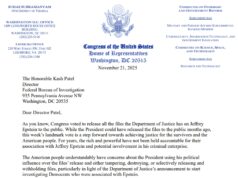Yesterday, the American people gave the Democrats a mandate to act as a check on this lawless President.
Today, the Washington Post reports that this shameless man in the Oval Office declared that “he would react aggressively to any attempt to probe his administration.”
He referred to adopting a “warlike posture” if the Democrats use their position in the House to investigate him.
That is, in a move that would have been unthinkable from any previous President, Trump threatened some kind of “war” if the Democrats were to act to fulfill their “check-and-balance” role of overseeing the executive branch, and their constitutional duty to “protect and defend the Constitution of the United States.”
Make no mistake, an intensification of the Trump Wars is on the horizon, and likely not so far off.
Besides the new reality that at last there’s some power — including the power of subpoena — in the hands of a Party that is not subservient to this atrocious President, there is also the fact that we’re back to “Game On” in the Mueller investigation. Additionally, Trump has given us good reason to suspect there’s nothing he will not do to protect himself from that investigation.
So an escalation of conflict is foreseeable. Perhaps inevitable.
Thus the question arises: How can the Democrats best work to fulfill their mandate, while minimizing the damage that Trump might inflict on the nation as he quite predictably wages a kind of “war” that puts his own interests ahead of the good of the nation?
The danger here can hardly be over-estimated.
Former Republican strategist Steve Schmidt described Trump as fomenting a “cold Civil War.”
Similarly, Democratic Virginia Delegate Mark Levine has predicted that Trump “will work like hell to drive our country closer to a second Civil War.”
Such a “Civil War” does not need to be physical — involving armies — to do great damage. Just the intensity of division, conflict, and hatred can suffice.
(What a coup Trump’s presidency has been for Putin and his Russian kleptocratic minions!)
It is a matter of the greatest importance, therefore, for the Democrats’ to plan well, and execute well, as this conflict unfolds.
And the strategic challenge here is made more complex by the fact that the overriding goal — the goal of PROTECTING THE NATION at this dangerous moment — has two chief components.
The first of these is to CHECK THE PRESIDENT. The second is to MINIMIZE the damage that President can inflict on America as he attempts to foment “civil war” to save himself.
Are the Democrats up to this difficult challenge?
When Trump spoke of his readiness for war against the Democrats if they should dare to do their jobs, he expressed confidence.
“The Democrats, Trump said, “can play that game, but we can play it better… I could see it being extremely good for me politically because I think I’m better at that game than they are, actually…”
There’s good reason to fear that he might be right about his being better than the Democrats at playing that “game” — i.e. waging the kind “war” he’s threatening. Picking fights and exploiting divisions is really the only way that Trump ever operates.
Engaging in such a war puts Trump in his element (like Brer Rabbit being thrown into the briar patch).
By contrast, the Democrats (and Liberal America generally) don’t relish conflict. Hatred — the fuel that Trump feeds his base — is a dirty word in liberal circles.
(Indeed, over the past quarter century, the Democrats’ insistence on pursuing cooperation and maintaining cordiality even as the Republican Party became the ugliest, most dishonest, most destructive major political party in American history, has played an important role in allowing a political force so ugly as this GOP to gain power over the past quarter century.)
So, at this crucial moment of a new starting point in the battle, we have reason to step back and ask questions about how the Democrats might best go about the daunting task of protecting the nation at this dark time.
It is such questions that preoccupy me right now. And in the days/weeks ahead I intend to share here a series of pieces laying out what I hope will be useful contributions to such a discussion.



![Saturday News: “Trump Has a Recipe for War and Corruption, Not Peace”; “Trump and Mamdani’s White House Lovefest Leaves Trump Allies ‘Shocked'”; MTG Announces Resignation, “expects the MAGAs to lose the midterms, and for Donald Trump…to be impeached”; Thanks to Trump, “[VA’s] fiscal situation is not healthy”](https://bluevirginia.us/wp-content/uploads/2025/11/montage1122-238x178.jpg)








![Saturday News: “Trump Has a Recipe for War and Corruption, Not Peace”; “Trump and Mamdani’s White House Lovefest Leaves Trump Allies ‘Shocked'”; MTG Announces Resignation, “expects the MAGAs to lose the midterms, and for Donald Trump…to be impeached”; Thanks to Trump, “[VA’s] fiscal situation is not healthy”](https://bluevirginia.us/wp-content/uploads/2025/11/montage1122-100x75.jpg)
